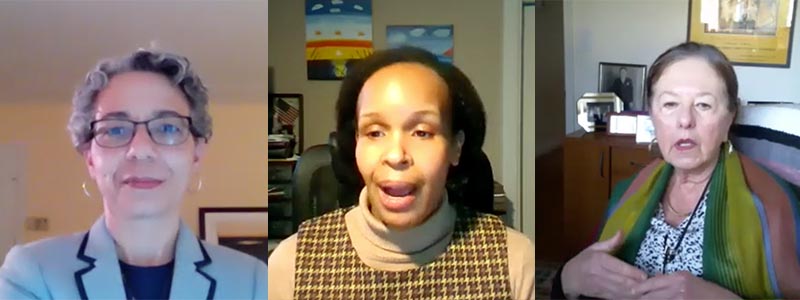“A Subtraction of Benefits”: Panel Takes on Junior Faculty Identity Taxation
Share

The tripartite tenure formula of research, teaching, and service is a commonplace in American colleges and universities. At many institutions, research is weighted most heavily, with teaching second (though whether a close or a distant second depends on the institution).
Most campuses value service far less. In an informal 2019 survey by the Institute of Citizens & Scholars, academic leaders said service counted for 10 to 20 percent of a junior faculty member’s tenure case at their institution. At the same time, 35 to 40 percent of respondents said faculty of color and women faculty were doing too much service, more so than white male peers. The time investment can hamper tenure progress, and it often seems tacitly expected of underrepresented minority (URM) faculty.
In 1994, psychologist Amado Padilla called this phenomenon “cultural taxation.” In 2020 Tiffany Joseph NWM ’15 and her colleague Laura Hirschfield proposed the alternative term “identity taxation,” recognizing that women and LGBTQ people also encounter such demands.
Dr. Joseph, a sociologist at Northeastern University, and two colleagues discussed the issue at a panel, “Alleviating Identity Taxation: Can the Humanities Lead,” during the November 2020 National Humanities Conference. Citizens & Scholars hosted the panel, which stems from the work of the Mellon Emerging Faculty Leaders Award program, with Vice President Beverly Sanford as moderator.
“Despite their smaller numbers,” Dr. Joseph said, Black, Latinx, and Native American faculty “mentor students of color [and] do diversity-related service in their departments and institutions, and oftentimes these types of activities are valued very little, or not at all, when it comes to tenure and promotion decisions.” The co-author of “ ‘Why Don’t You Get Somebody New to Do It’: Race and Cultural Taxation in the Academy” (Ethnic and Racial Studies, 2013), Dr. Joseph is also currently editing a special journal issue on racism and sexism in the academy.
Ruth Enid Zambrana—Distinguished University Professor in the Harriet Tubman Department of Women, Gender, and Sexuality Studies and Director of the Consortium on Race, Gender and Ethnicity at the University of Maryland—also took part in the panel. Dr. Zambrana, the author of Toxic Ivory Towers: The Consequences of Work Stress on the Health of Underrepresented Minority Faculty, observed that, in the half-century since the civil rights movement, URM faculty have experienced not an accrual of benefits but a “subtraction of benefits.”
This year, facing COVID-19 and the nation’s racial reckoning, many pre-tenure faculty confront even greater stresses than usual: remote teaching while caregiving, uncertainly about tenure timelines and research access, increased student needs for support, and, for faculty of color, institutional requests for engagement in efforts to address racism and assure inclusion. These conditions, Dr. Zambrana noted, heighten inequities, particularly for Black and brown faculty: “Universities are approaching the COVID era as if everyone needs the same [kind of support], and they are not taking into account that URM faculty are at a disadvantage,” with greater risks and fewer resources.
For campuses, said Michele Minter, Vice Provost for Institutional Equity and Diversity at Princeton University, identity taxation is “both a widely seen problem and at the same time a weirdly invisible one,” with an unquestionable impact on faculty retention and climate. Institutions have not typically collected or used data well in this area, she added: “There are systems that should work,” Vice Provost Minter said. “They’re just not calibrated right. They don’t value all kinds of service equally, and they don’t measure all kinds of service equally. That academic department measuring service isn’t necessarily taking into account that institution-wide task force on racial equity.”
Panel attendees exchanged ideas about addressing identity taxation, such as release time, reevaluation of different types of service, or changes in faculty incentive and reward systems that recognize stoppages in tenure clocks due to the pandemic. Beyond specific solutions, the panelists emphasized the need to understand systemic racism in the institutional setting—with identity taxation as a key example—and to change that culture.
“That’s often one of the most difficult things to tackle,” Dr. Joseph pointed out. “How do you transform the culture of a place that was created without many of us in mind? …That’s where the really hard work comes in. It’s not going to be easy and it’s going to require long-term commitment and investment.”
The impetus, Dr. Zambrana added, must come from majority-culture institutions and funders themselves: “This is a difficult conversation. This is a provocative conversation. … How do you engage your own group?” Vice Provost Minter noted, “Every conversation like this is a spur to go back and push harder on questions.”
Stay Engaged
Get More News
Join our mailing list to get more news like this to your mailbox.
Support Our Work
Help us invest in the talent, ideas, and networks that will develop young people as effective, lifelong citizens.
Ways to Support Us